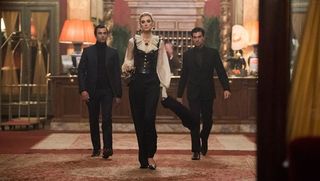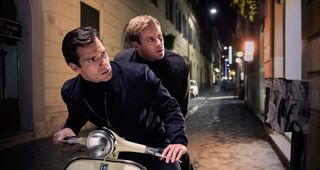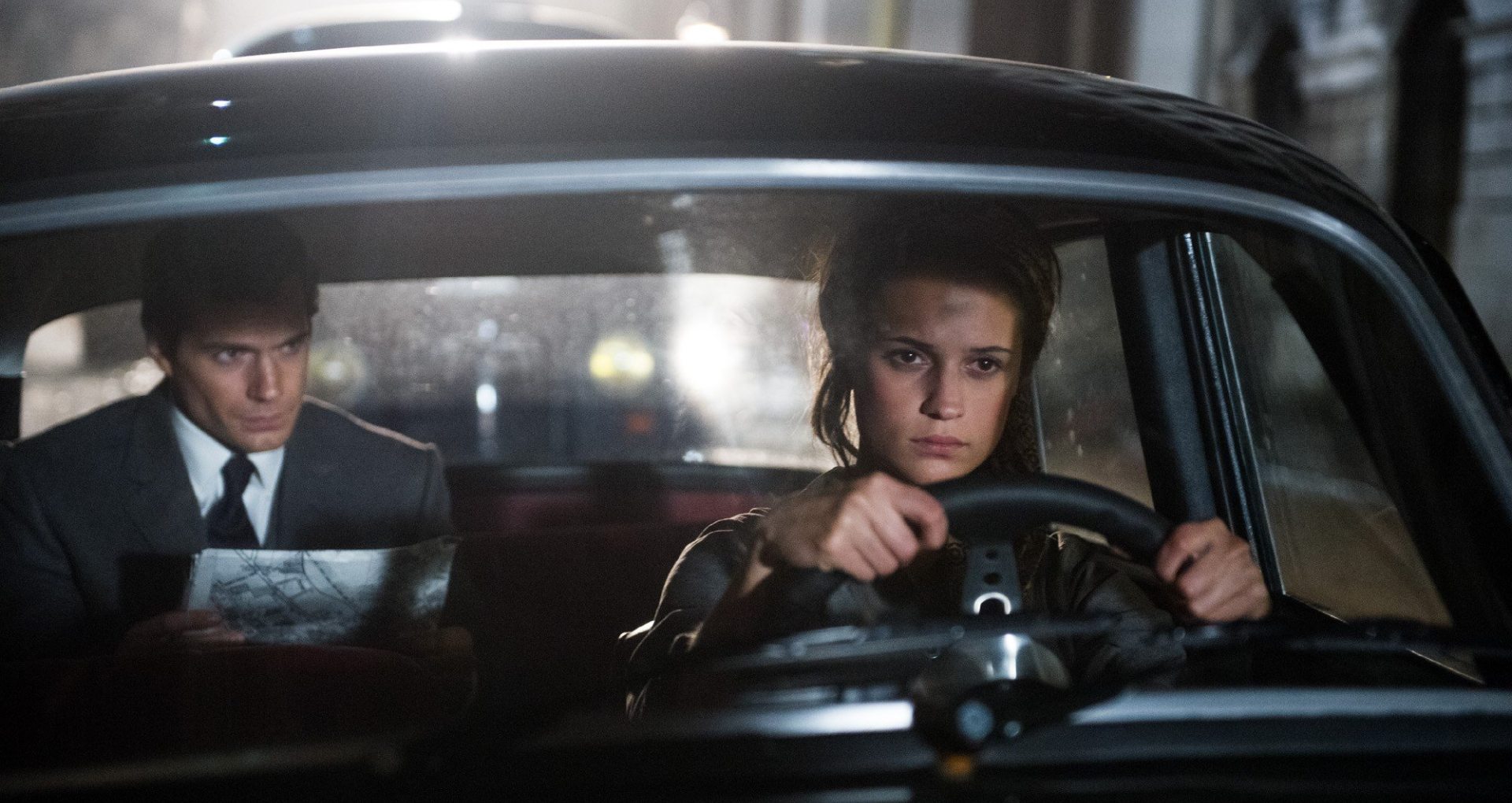GamesRadar+ Verdict
When it takes a breather from the OTT action, Ritchie's period caper revels in double (and triple) crosses, Cold War intrigue and vintage kicks. Fun, but not quite the old-school Bond it wants to be.
Why you can trust GamesRadar+
I spy, Superman and the Lone Ranger...
“Things could get kind of messy, end of the world, you know,” warns spy Napoleon Solo early on in The Man From U.N.C.L.E. They're apt words for a film that busily jets around the globe while chucking in car chases, femme fatales, Nazi scientists, clashing anti-heroes, a nuclear bomb and more innuendo than you can shake a meat truncheon at.
Oh, and it all takes place in the 1960s, so trippy fashion, low-fi tech and retro automobiles are also added to the mix. Yes, things get kind of messy in Guy Ritchie's long-in-the-making TV update, but thanks to the Brit director's clear love of vintage Bond, the manic hodgepodge is often accompanied by winning nod-winks to the golden era of spy thrillers.
We kick off in 1963 East Berlin, where CIA Agent Napoleon Solo (Henry Cavill) enlists the help of German auto mechanic Gaby Teller (Alicia Vikander) in tracking down her missing father, Dr Udo Teller, who was Hitler's favourite rocket scientist.
When they're busted by Russian KGB Agent Illya Kuryakin (Armie Hammer), the pair manage to escape over the Berlin wall, only for Solo to discover he's been partnered with Kuryakin to take down an international crime organisation hell-bent on trashing the world with nuclear weaponry.

Naturally, the pairing doesn't go down well with these alpha males, and the next 100 minutes finds the traditional enemies squabbling over game-plans, testing each other's limits, and grappling with the very real possibility that either could double cross the other at any moment.
If Ritchie's Sherlock Holmes films were optimistic buddy movies, U.N.C.L.E. (short for United Network Command for Law and Enforcement) is the anti-buddy movie. It's an enticing prospect, especially as the film imagines an origins story for Solo and Kuryakin that the '60s TV series (starring Robert Vaughn and David McCallum) never bothered with.
The problem is, Sherlock had Robert Downey Jr., and U.N.C.L.E. doesn't. So while Cavill and Hammer are capable action men, the tight-wound rivalry doesn't always work. Cavill's blue-eyed and uber-coiffed, his Superman physique straining inside tailored suits, but he's little more than GI Joe crossed with 007, his art thief backstory acknowledged then dismissed.
Meanwhile, Hammer's “Red Peril”, as Solo calls him, is prone to rages and can take out an entourage of armed cops without breaking a sweat – even though he's sort of dressed like Del Boy. “Your balls are at the end of a very long leash held by a very short man,” he growls at Solo.

The pair's tug-of-war is played for laughs early on – see cute running gags about their fashion sense and competing tech – but a lot of the quips feel stiff as an iron curtain, and it's unclear if some of the wobbly banter (“I'll take top, you take bottom”) is knowingly homoerotic or just a little bit lame.
It's a relief, then, when the film's first-half preoccupation with OTT action and double entendre mellows into a more subdued and interesting paranoid thriller – a holdover, perhaps, from Steven Soderbergh's pass at the script in 2012. It's here that the relationship between the duo shows any real edge, and builds to a surprisingly poignant moment involving a wristwatch.
Not that this is a film particularly interested in edge. Ritchie – who has a co-writing credit for the first time since 2008's RocknRolla – prefers the gold-hued kitsch of '60s Bond to the Cold War paranoia of The Ipcress Files or The Manchurian Candidate.
He revels in the period detail (split-screen, Nina Simone on the soundtrack), and it's a canny move to locate U.N.C.L.E. in the same period as the original show, setting it apart from franchises like Bourne, Mission: Impossible and even contemporary Bond. There are times Ritchie's film really feels like it's been sprung from a time capsule – witness a remote mansion segment steeped in browns and burnt orange.

Elsewhere, an underused Jared Harris as Solo's handler seems to have stepped off the set of Tinker, Tailor, Soldier, Spy, grumbling his lines (“Inside every Kraut there's an American trying to get out”) and emboldening some of the film's best scenes – including a lovely moment in which every person in a busy lakeside cafe gets up and leaves at the same time he does.
Meanwhile, Hugh Grant is a jovial addition as the titular Man, clearly having fun doing something different, though like Harris and the hugely likeable Vikander, he's ultimately little more than window dressing.
Coming in the wake of battier Bond hat-tip Kingsman: The Secret Service – and just two months ahead of SPECTRE – The Man From U.N.C.L.E. can feel oddly tame. While it lacks a memorable villain, and the central pairing fizzes but never sparks, the film gets by on its vintage charm and a third act upswing – and, for all its messiness, it'd be a shame not to see Solo and Kuryakin rutting horns again.
More info
| Theatrical release | 14 August 2015 |
| Director | Guy Ritchie |
| Starring | "Henry Cavill","Armie Hammer","Hugh Grant","Alicia Vikander","Elizabeth Debicki","Jared Harris" |
Josh Winning has worn a lot of hats over the years. Contributing Editor at Total Film, writer for SFX, and senior film writer at the Radio Times. Josh has also penned a novel about mysteries and monsters, is the co-host of a movie podcast, and has a library of pretty phenomenal stories from visiting some of the biggest TV and film sets in the world. He would also like you to know that he "lives for cat videos..." Don't we all, Josh. Don't we all.

Nintendo Switch 2 launch price won't "really matter," analyst says, because early Nintendo buyers "aren't very price-sensitive" anyway – if it's not "egregious," it will sell

Nintendo Switch 2 leaks "essentially ruined the reveal" according to one analyst: "It was very unfortunate for Nintendo"

The Hollow Knight: Silksong ARG turned out to be us clutching at straws, but dev says: "the game is real, progressing and will release"
Most Popular

